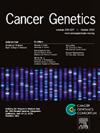78. Next generation cytogenomics improves patient risk stratification in acute myeloid leukemia
IF 1.4
4区 医学
Q4 GENETICS & HEREDITY
引用次数: 0
Abstract
The European Leukemia Network (ELN) has established criteria for patient risk stratification based on cytogenetic abnormalities in observed in acute myeloid leukemia (AML). Risk stratification based on cytogenetic analysis is commonly used to guide therapy selection and overall patient care. Proximity ligation sequencing (PLS) is a next generation cytogenomic method that uses short-read NGS to capture ultra-long-range genomic contiguity and detect chromosome abnormalities including those in the ELN risk stratification. To test the utility of PLS in evaluating cytogenetic risk in AML, we performed a retrospective study of AML cases gathered from clinical archives. In all, libraries from 95 samples were prepared using the OncoTerra PLS library preparation kit and sequenced on one of three platforms: Illumina, Element, or Singular short-read sequencing platforms. Libraries sequenced across all three platforms passed QC metrics for library performance. Patient risk based on variants identified by the OncoTerra PLS analytic platform and the reported standard-of-care cytogenetics were assessed following the ELN 2022 guidelines. The predictive power of OncoTerra and standard-of-care cytogenetics were evaluated based on the overall survival of patients segregated into favorable, intermediate, and adverse risk categories. Statistical comparison of Kaplan-Meier analysis between OncoTerra and standard-of-care cytogenetics demonstrated that PLS significantly improved the segregation of patient outcomes across risk groups. These findings show that PLS has the potential significantly improve cytogenetic risk stratification within the context of established ELN risk variants for AML using short-read sequencing platforms.
78.新一代细胞基因组学改进了急性髓性白血病患者的风险分层
欧洲白血病网络(ELN)根据观察到的急性髓性白血病(AML)细胞遗传学异常,制定了患者风险分层标准。基于细胞遗传学分析的风险分层通常用于指导治疗选择和整体患者护理。近接测序(PLS)是一种下一代细胞基因组学方法,它使用短线程 NGS 捕获超长程基因组连续性并检测染色体异常,包括 ELN 风险分层中的染色体异常。为了测试 PLS 在评估急性髓细胞性白血病细胞遗传学风险方面的实用性,我们对临床档案中收集的急性髓细胞性白血病病例进行了回顾性研究。我们使用 OncoTerra PLS 文库制备试剂盒制备了 95 份样本的文库,并在三种平台之一上进行了测序:Illumina、Element或Singular短线程测序平台。在所有三个平台上测序的文库都通过了文库性能 QC 指标。根据 OncoTerra PLS 分析平台确定的变异和报告的标准护理细胞遗传学,按照 ELN 2022 指南评估了患者风险。OncoTerra 和标准护理细胞遗传学的预测能力根据患者的总生存期进行评估,患者被分为有利、中等和不利风险类别。通过对 OncoTerra 和标准护理细胞遗传学的 Kaplan-Meier 分析进行统计比较,结果表明 PLS 显著改善了不同风险类别患者的预后。这些研究结果表明,在使用短线程测序平台对急性髓细胞性白血病进行ELN风险变异的情况下,PLS有可能显著改善细胞遗传学风险分层。
本文章由计算机程序翻译,如有差异,请以英文原文为准。
求助全文
约1分钟内获得全文
求助全文
来源期刊

Cancer Genetics
ONCOLOGY-GENETICS & HEREDITY
CiteScore
3.20
自引率
5.30%
发文量
167
审稿时长
27 days
期刊介绍:
The aim of Cancer Genetics is to publish high quality scientific papers on the cellular, genetic and molecular aspects of cancer, including cancer predisposition and clinical diagnostic applications. Specific areas of interest include descriptions of new chromosomal, molecular or epigenetic alterations in benign and malignant diseases; novel laboratory approaches for identification and characterization of chromosomal rearrangements or genomic alterations in cancer cells; correlation of genetic changes with pathology and clinical presentation; and the molecular genetics of cancer predisposition. To reach a basic science and clinical multidisciplinary audience, we welcome original full-length articles, reviews, meeting summaries, brief reports, and letters to the editor.
 求助内容:
求助内容: 应助结果提醒方式:
应助结果提醒方式:


